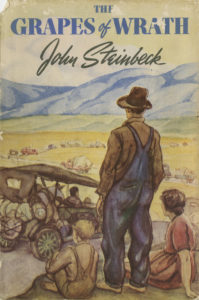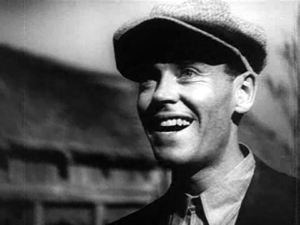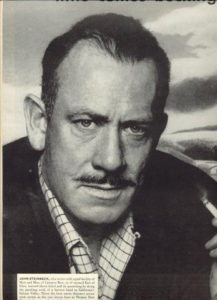Happy Thanksgiving, class! In theme with the holidays, I have created a list of the novels I am most thankful for. This time, students, it’s personal.
To clarify: I’m not listing the best novels, or even my favorite novels. These are simply novels that have changed my life. If it made me who I am today, it qualifies. I’m also including works that are kind of novels, but I’m excluding anything that clearly is not a novel. Hamlet and The Bible are on the “50-Books” list, but neither of them are novels, so they aren’t here.
Here’s the list, in unbiased alphabetical order:
- The Boxcar Children Series by Gertrude Chandler Warner
These are the first books I remember reading. Warner’s kid-friendly mysteries involved four siblings, always dealing with personal struggles, but always outsmarting their own situations by working together. The Boxcar Children started me on a path of reading with desperation—to find out how it ends, to solve the mystery, to discover the twist. It was also a series that I started reading with my mom and older sister, so it tends to bring emotional roots to the surface. Eventually, though, I started reading ahead of them. They were going too slow.
- Citizen: An American Lyric by Claudia Rankine
On the opposite end of the spectrum is a profound and challenging kind-of-novel. Citizen is a lyrical portrayal of the kind of racism the modern American experiences. With hodgepodged prose-poetry and powerful pictures, Rankine describes American citizenship in the context of the racism that still plagues our country. I put it on this list because nothing has helped me understand modern racism and white privilege more completely, as well as the distance we have yet to travel as a society in order to achieve equality.
- The Harry Potter Series by J. K. Rowling
Sometimes, I use this series to define me, as well as the generation I’m a part of. The Boxcar Children taught me to read desperately, and the first time I read these books, I missed the subtleties as I flew through each chapter. The Harry Potter movies revealed what I had missed, and then the books showed me what the movies had missed—Harry Potter taught me the value of rereading, so much so that I’ve lost count of how many times I’ve read each book. It’s also just plain awesome.
Read my previous post on Harry Potter to learn more!
- Oh, The Places You’ll Go! by Dr. Seuss
Surprisingly, this book had more meaning as I grew up. As a child, I don’t remember reading it, but I picked it up again for a strange assignment in college (I’ll spare you the gory details). But suddenly, with my career choices ahead of me and my future in question, this book made all kinds of sense. Dr. Seuss’ works have a way of speaking to the soul, bypassing the mental challenge of reading entirely. Though I could have chosen any of his other soul-speaking works, this one gave me the best advice, and I’m particularly grateful for that.
- A Tale of Two Cities by Charles Dickens
This is one of those novels that isn’t really my favorite. I like it, certainly, but it took me two tries to really get into it. My first try reading this novel was a catastrophic nightmare (again, I’ll spare you the gory details), but when I read it again, there was a moment that sticks with me to this day. I was speaking to my dad about parts of the novel that impressed me, and about the characters, and the symbolism, and this cool part over here and that cool part over there…when he stopped me and asked if I had ever considered being a teacher.
That conversation changed my life. On one hand, it gave me the inspiration to discover the passion and empathy I have with children, and the beauty in that incredibly important job. On the other hand, it has caused me more strife, anguish, and panic than I have ever experienced. As odd as it seems, I am thankful for both the good and the bad that came of it.
I’ll be saving most of my Ulysses discussion for the blog post dedicated to it, way off somewhere in the future, but it would be a disservice not to mention it. Everything I’ve read since reading Ulysses feels different. My own writing feels different. Ulysses taught me to see differently, to question even the most fundamental truths, and to understand the everyday human experience as an epic journey out into the world and back again. I finished it almost a year ago now, and I still fell a swell of awe and beauty remembering the heroes of Joyce’s Dublin.
- Wicked by Gregory MaGuire
My last selection is a complicated choice, but I ultimately chose it for the same reason Harry Potter impacted me. Harry Potter grew up, and the series grew up with him, and I grew up with the series. Wicked did something similar—it took a story I knew and made it more adult (by that, of course I mean it was more chaotic, more complicated, and less censored than the original). Excluding classroom literature assignments, I think this is the first truly “adult” book I ever read. It entered me into a world I didn’t really like, but couldn’t look away from either, and it’s deliberate non-structure, harsh political themes, and challenging ideas about evil strained my previously held notions.
You knew this question was coming—what books are you thankful for? Let me know in the comments.
I won’t be able to post next week—class is officially cancelled (and I LOVE that I have the power to do that). For the month of November, I have been participating in NaNoWriMo, or National Novel Writing Month. If you’ve heard of it or tried it, you’ll know the immense joy and suffering I am experiencing during the month of November. It just so happens that the last day of the month is on a Wednesday, when I would usually have my blog post ready to go. I will instead dedicate the last week of November to my own fantasy fiction.
Enjoy your Thanksgiving and your November!
Prof. Jeffrey



Recent Comments